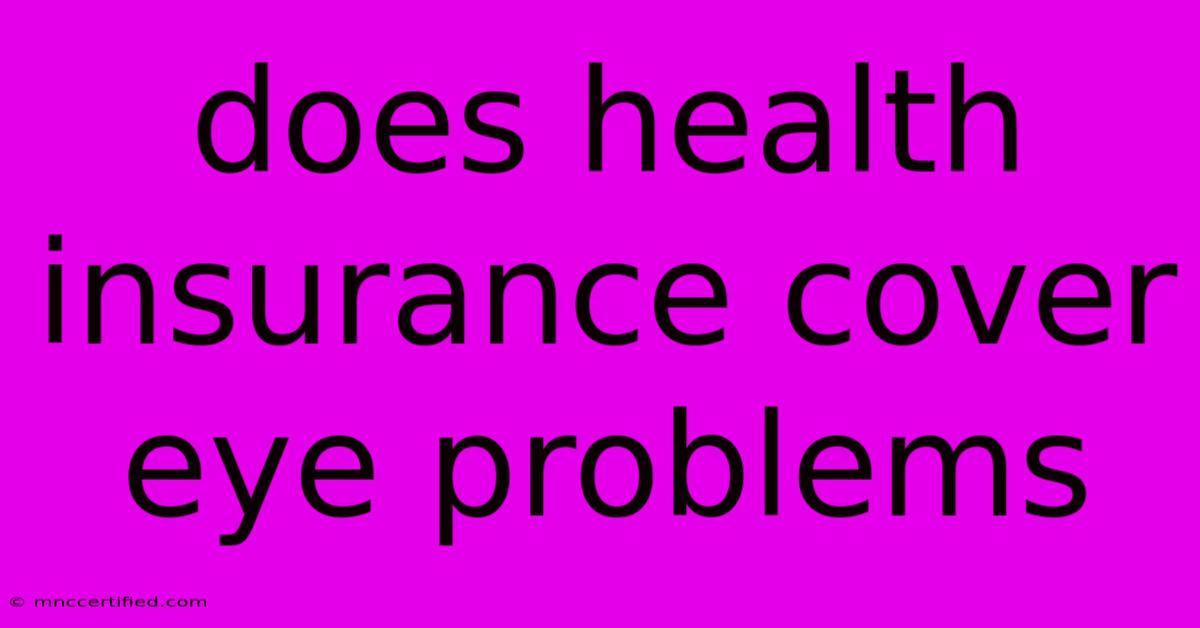Does Health Insurance Cover Eye Problems

Table of Contents
Does Health Insurance Cover Eye Problems? A Comprehensive Guide
Navigating the complexities of health insurance can be a daunting task, especially when it comes to understanding what your plan covers. Eye problems are a common concern, and many individuals wonder if their health insurance will provide financial assistance for treatments and procedures. This guide will break down the key aspects of health insurance coverage for eye problems, providing valuable insights for informed decision-making.
Understanding Health Insurance and Eye Care
Before delving into specific coverage details, it's crucial to grasp the fundamentals of health insurance and how it relates to eye care.
- Health Insurance Plans: These plans provide coverage for a wide range of medical expenses, including doctor visits, hospital stays, and prescription medications. Eye care services are often included, but the extent of coverage varies significantly based on the plan's design.
- Vision Insurance: Distinct from health insurance, vision insurance plans focus specifically on eye-related services like eye exams, contact lenses, and eyeglasses. They typically have separate coverage limits and may not cover complex eye conditions or procedures.
What Eye Problems Are Covered by Health Insurance?
The types of eye problems covered by health insurance are typically determined by the plan's Essential Health Benefits (EHB), which are mandated by the Affordable Care Act (ACA). These benefits include:
- Routine Eye Exams: Most health insurance plans cover annual eye exams for adults and children, particularly for those with vision problems.
- Eye Conditions: Health insurance often covers treatment for various eye conditions, including:
- Glaucoma: A condition that damages the optic nerve.
- Cataracts: Clouding of the natural lens in the eye.
- Macular Degeneration: A condition that affects the central part of the retina.
- Diabetic Retinopathy: A complication of diabetes that damages the blood vessels in the retina.
- Retinal Detachment: A condition where the retina separates from the back of the eye.
- Eye Surgery: Some plans may cover surgery for certain eye conditions, but there are often limitations and pre-authorization requirements.
- Medications: Prescription medications for eye conditions may be covered by health insurance, depending on the specific plan.
What Eye Problems are Not Covered by Health Insurance?
It's important to remember that not all eye problems are covered by health insurance. Here are some common examples:
- Refractive Errors: These include nearsightedness (myopia), farsightedness (hyperopia), and astigmatism. While some plans may offer limited coverage for corrective lenses (eyeglasses or contacts), they generally do not cover the cost of refractive surgery like LASIK.
- Cosmetic Procedures: Procedures purely for cosmetic purposes, such as eyelid surgery or laser eye reshaping for aesthetic reasons, are typically excluded from health insurance coverage.
- Over-the-Counter Eye Drops: These are usually not covered by health insurance.
Tips for Understanding Your Coverage:
- Review Your Policy Carefully: Thoroughly read your insurance policy to understand the specific benefits, limitations, and exclusions related to eye care.
- Contact Your Insurance Provider: Don't hesitate to contact your insurance company directly to clarify any questions or concerns you have regarding coverage for eye problems.
- Explore Vision Insurance Options: Consider purchasing a separate vision insurance plan to complement your health insurance and potentially cover costs associated with eye exams, glasses, and contact lenses.
- Check for Pre-authorization Requirements: Some procedures and treatments require pre-authorization from your insurance company. Be proactive in obtaining this approval before undergoing any significant eye care.
Finding Affordable Eye Care Options:
Navigating eye care costs can be challenging, but there are options to help make it more manageable:
- Negotiate with Your Provider: Discuss payment options and potential discounts with your eye care provider.
- Consider a Vision Discount Program: Explore membership programs that offer reduced pricing on eye care services and products.
- Seek Out Low-Cost Clinics: Many community health centers and free clinics provide eye care services for low-income individuals.
- Government Programs: Explore government programs like Medicaid or Medicare for individuals who qualify.
Conclusion:
Understanding the complexities of health insurance coverage for eye problems is crucial for making informed decisions about your eye care. By carefully reviewing your policy, contacting your insurance provider, and exploring available resources, you can navigate the system more effectively and access the care you need. Remember, proactive communication with your insurance company and eye care provider can help ensure that you receive the proper treatment and financial assistance for your eye health.

Thank you for visiting our website wich cover about Does Health Insurance Cover Eye Problems. We hope the information provided has been useful to you. Feel free to contact us if you have any questions or need further assistance. See you next time and dont miss to bookmark.
Featured Posts
-
Houshmandzadeh Sees Potential In 2024 Bengals
Nov 08, 2024
-
How To Find If Someone Has Car Insurance
Nov 08, 2024
-
Gerardi Insurance Services Inc Putnam Ct
Nov 08, 2024
-
Genesis Medical Group Insurance Accepted
Nov 08, 2024
-
How Much Is No Proof Of Insurance Ticket
Nov 08, 2024